The build-up to England’s bid to win the 2015 World Cup should have already begun. It should have started the day after France beat them in the quarter-final of the 2011 tournament. But amidst the wreckage of the RFU’s destructive in-fighting and the reviews on reviews that waste time and defend those whose roles have been indefensible, be sure that 2015 is only being considered in logistical and economic terms.
England will do this side of 2015 well. Whether there will be the long-term planning required to produce a similarly successful team is another matter. To achieve global success, a long-term vision has to exist. Asked how and why New Zealand triumphed this time around, Graham Henry was adamant: “Four years of planning.” And that is what it took the world’s best team to prevail on home turf.
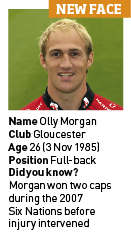 England have fallen far and fast. They have never looked remotely like a great side since 2003 (and that includes the gutsy but fortunate team of 2007) because they have never planned with the intellectual range that is part of the plan. From Rod Macqueen in 1999 through Clive Woodward, Jake White and Henry, all the triumphant management teams have retained a view over the horizon towards the four-yearly event; that is not to sacrifice the importance of the next Test match but it is to recognise that winning the next game is not the be-all and end-all.
England have fallen far and fast. They have never looked remotely like a great side since 2003 (and that includes the gutsy but fortunate team of 2007) because they have never planned with the intellectual range that is part of the plan. From Rod Macqueen in 1999 through Clive Woodward, Jake White and Henry, all the triumphant management teams have retained a view over the horizon towards the four-yearly event; that is not to sacrifice the importance of the next Test match but it is to recognise that winning the next game is not the be-all and end-all.
England have to possess the capacity to meet the next challenge while keeping the World Cup at the forefront of the mind. It means feats of juggling when it comes to selecting the current best XV, as opposed to the potentially best World Cup XV. It requires a steely determination to lose a battle to win the wider World Cup war. It therefore demands that when a selection issue is a 50-50 decision, potential should trump experience.
This is not to dismiss the value of experience. Rather, this strategy paradoxically recognises the fact. The time when experience most comes into its own is when the pressure is greatest and that is, of course, at the World Cup. Martin Johnson and those before him fumbled by bowing to the immediate pressure for results and the instinctive fall-back upon experience that is part of the managerial make-up in these cautious climes.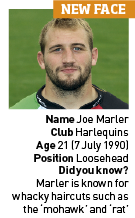
Hence when a World Cup arrives, a young talent like Ben Youngs struggles to extricate himself from a poor run of form because he is a year short of the sort of experience required to understand and work the problems out. If anyone thinks England would have won the World Cup in 2003 had Woodward not blooded Jonny Wilkinson and Jason Robinson on the basis of potential and not deserved form, they are desperately deluded.
It’s not a case of throwing caution to the wind but very much a case of learning lessons that should be easily learned from 2003 onwards. England need a vision and men with the potential to grow to the stature to fill the picture in. If the current best in a certain position lacks that quality then don’t pick him; gamble on youth or convert a player from another position. Be brave.
That’s the slogan for the next four years – Be Brave. Explain the strategy and develop potential. There will be setbacks – there were with Woodward – but a steady nerve and a clear explanation of strategy would give the new manager the leeway to search for world-class performance and not the next win.
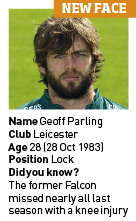 And that is what England have been lacking. Whoever is in charge, let us hope that vision is in place and the England team selected to face Scotland in Edinburgh on 4 February 2012 has one eye peering southwards over Hadrian’s Wall to Twickenham and 2015.
And that is what England have been lacking. Whoever is in charge, let us hope that vision is in place and the England team selected to face Scotland in Edinburgh on 4 February 2012 has one eye peering southwards over Hadrian’s Wall to Twickenham and 2015.
On the basis of a forward-thinking plan (intellectually and not tactically), this is the sort of team I would love to see run out at Murrayfield.
Joe Marler has the attributes required at loosehead and the man in front of him on ability, Andrew Sheridan, isn’t going to be around in 2015 so pick the Harlequin.
Tom Youngs is a crystal-ball choice at hooker but right now he has too much to prove and too little exposure in what is an unforgiving position, so Dylan Hartley’s experience wins the day with another bright young Harlequin, Joe Gray, getting game time from the bench.
At tighthead prop, Paul Doran-Jones should have been taken to the World Cup and with Northampton doubtless grooming him diligently he can explode from the shadow of the excellent Brian Mujati into the England limelight, much as Dan Cole did whilst playing second fiddle to Martin Castrogiovanni.
Potential and performance merges in the imposing shape of Courtney Lawes. He needs a more dynamic team than the lethargic Class of 2011 but he’ll be one of the core components of a well-drilled and high-tempo England side.
Tom Palmer is still a fine player and Louis Deacon does it for Leicester but it’s another Tiger, Geoff Parling, whose combination of lineout skill, rugby brain and sheer athleticism means he has that crucial word – potential.
Potential is going to count for plenty in the selection of the crucial middle five.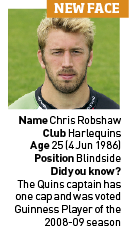
Three of the next five names have to be open to debate in terms of form, fitness and proof of international quality. Let us start with the most controversial one of them. I’m calling for Danny Cipriani to come home and wear the England No 10 shirt; he may be struggling to run his life off the field but he has the ability and sheer chutzpah to change the way England play for the better.
The finest England performance of the past eight years was Cipriani’s fly-half debut start for England against Ireland in 2008. He has a vast amount to prove in the matter of personal commitment – tackling opponents and a predilection for the celebrity lifestyle – but Robbie Deans had similar problems with players like James O’Connor and Kurtley Beale and look how his perseverance paid off.
Less controversial but still debatable is Youngs’s position at scrum-half. He has been injured and off form but one has to consider why he played so poorly for England at RWC 2011. The slow ball and the lack of experience are explanations enough for someone who remembers how he carved the Wallabies into pieces on an inspired afternoon at Twickenham last year.
The third and final big debating point concerns the identity of the captain. I’m looking for someone fresh and unscarred by the atrocities of England’s New Zealand campaign. Chris Robshaw is a perfect fit in that he is an experienced leader for a young man and a player whose improvement has been at an astronomical rate in the past two years. His club manager, Conor O’Shea, thinks him ready for the role; so do I.
His inclusion in the back row allows the team to have a degree of flexibility with Tom Wood predominantly at eight but occasionally switching to six or seven as England utilise the broad options of this back row with the same dexterity as France’s Julian Bonnaire and Imanol Harinordoquy did so successfully in the knockout stages of the World Cup.
Thi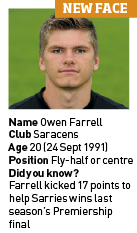 s is an England team picked for tempo but that’s not to underestimate the need for a calm brain and a physical presence to act as a fulcrum for those around him. Cue the utterly precocious Owen Farrell as the inside-centre who is everything Cipriani is not, but who maybe lacks some of the ethereal qualities of the former Wasp. They could be a wonderful fit.
s is an England team picked for tempo but that’s not to underestimate the need for a calm brain and a physical presence to act as a fulcrum for those around him. Cue the utterly precocious Owen Farrell as the inside-centre who is everything Cipriani is not, but who maybe lacks some of the ethereal qualities of the former Wasp. They could be a wonderful fit.
If – as I suspect – my preferential fly-half is on the other side of the world during the competition, I’d keep Farrell at 12 where his defence, distribution and kicking game make him a potential superstar. In the short term I might even consider Charlie Hodgson as a kind of nanny while we wait to see whether Leicester will give George Ford a chance to show whether his abilities match his reputation. I haven’t seen enough of him to comment.
Outside Farrell, Manu Tuilagi is the obvious choice. If injury holds him back, Jonny May or Jonathan Joseph make interesting contenders. Mike Tindall – or for that matter Steve Thompson and Jonny Wilkinson – will not be considered.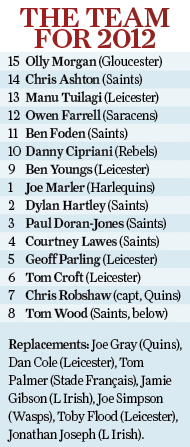
And so to the back three. For a brief spell an English resurgence last season was linked to their revelatory form. Chris Ashton is a high-class finisher and a man who reads the game well. Forget the swallow diving and some of the immature stuff off the field, he should be around for years to come and if this fantasy England team plays at the pace I hope, he is going to be breaking English try-scoring records.
His Northampton Saints mate, Ben Foden was, like Youngs, a disappointment at the World Cup but anyone who remembers his heroic Heineken Cup final performance in defeat against Leinster will be in no hurry to play the short-term memory game. I’ll not have nostalgic heroes of a bygone age in this team but a couple of games off form is most definitely not the same thing!
However, I would like to play Foden as a wing with a roving licence. The role of full-back is between three men in the Premiership: the most consistent of them, Mike Brown; the classiest, Saracens’ Alex Goode; and the most complete No 15, Olly Morgan.
Given the nature of the team, I think Morgan’s solidity wins the day without discounting the other two men.
This article appeared in the January 2012 issue of Rugby World Magazine.
Find a newsagent that sells Rugby World in the UK. Or you may prefer the digital edition on your MAC, PC, or iPad.
Would you like to sign up to Rugby World’s excellent weekly email newsletter? Click here.
For Back Issues Contact John Denton Services at 01733-385-170 visit





